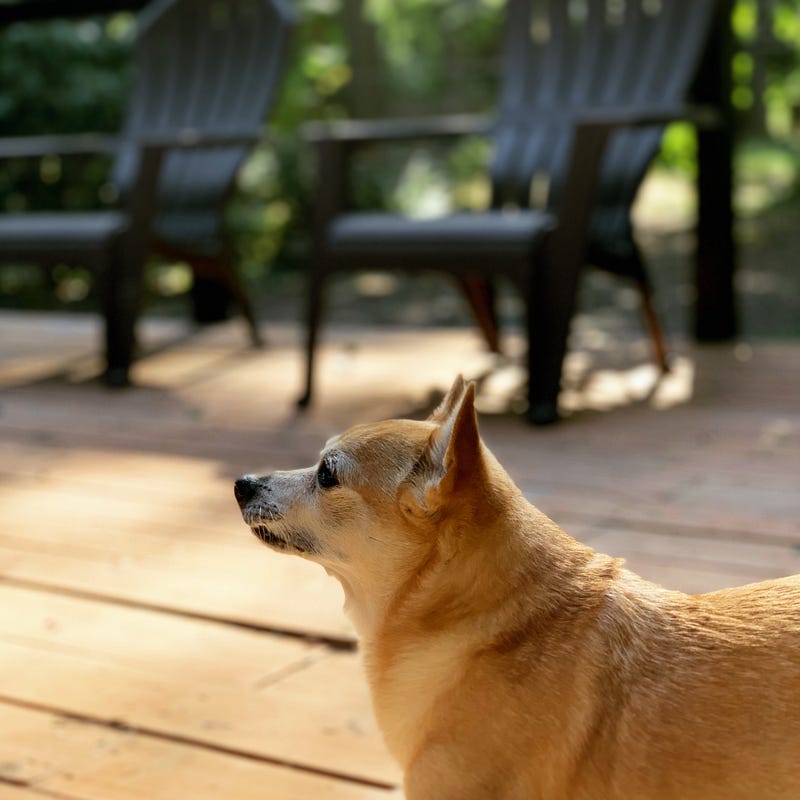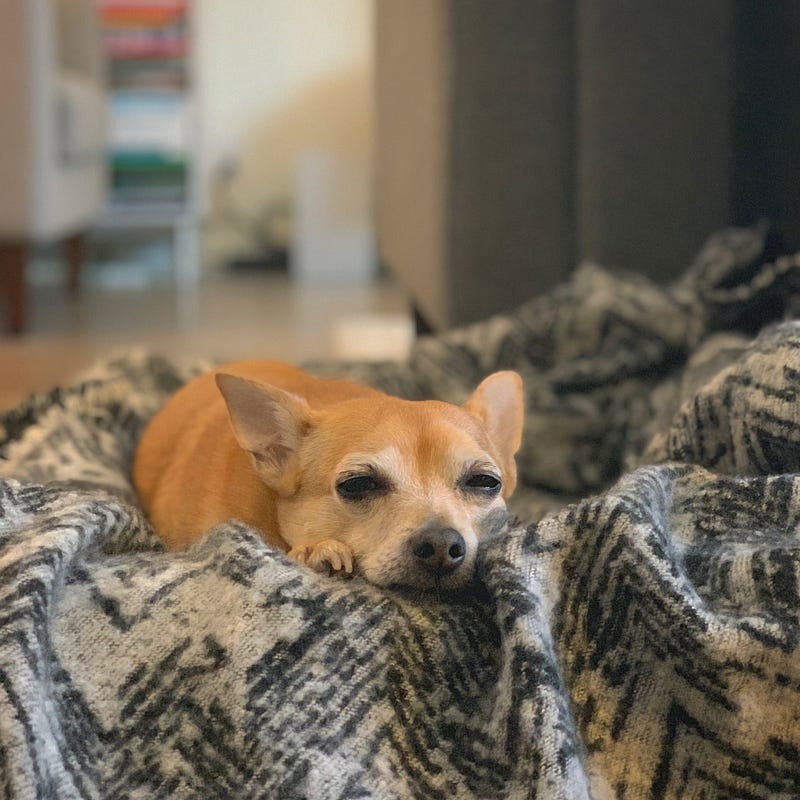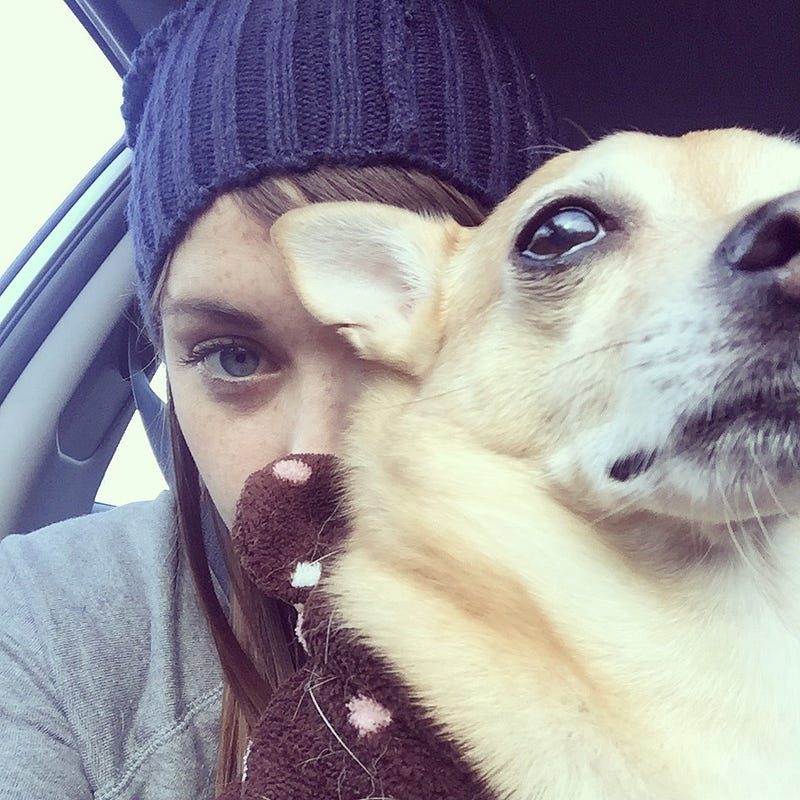Reflections on Life Lessons from Losing My Beloved Dog
Written on
Chapter 1: Remembering the Bond
In my thirties, I find myself reflecting on the years spent with my loyal companion, who was my anchor through my twenties. This week, I overlooked our anniversary—the day a young woman crossed paths with an unknown dog, leading to a beautiful friendship. For the past fifteen years, I would celebrate this day by sharing a photo and a story about his unique quirks and unwavering loyalty. This year, however, my mind is preoccupied with the approaching date that signifies a different kind of memory.
On October 1, I will recall the sunny, crisp afternoon when a compassionate angel came to help him find peace. I remember lying beside him, expressing my gratitude as he transitioned, swaddled and serene in her care. Dark humor crept in as I joked with my partner, pondering how many departed pets might be in that little Prius.
A year ago, I sensed his time was short. His persistent coughing was a sign of heart failure, and the medication had begun to compromise his kidneys. We were in a race against time, uncertain which organ would fail first.
As someone without children, my life revolved around Indiana. Together, we navigated through various apartments and cities, adapting to odd schedules and lengthy commutes. Our bond deepened as we experienced life’s ups and downs side by side. I dedicated my earnings to ensure his comfort, even purchasing him a Casper bed after a significant commission. It wasn’t until I added one of my scarves to it that he finally embraced it.
Our routine consisted of three daily walks, a habit I calculated to be over 14,000 walks throughout our years together.

Now, the void he left is more profound than ever. We are separated by the weight of his absence.
In the days following his passing, my home overflowed with flowers, plants, and gestures of kindness from friends. It was a time of unexpected support, making me ponder the reasons why many choose to marry or have children.
Yet, grieving a pet comes with its own challenges. While many understand the pain, it’s not as socially acceptable to take time off work. Conversations in public became awkward; I had to choose between a casual “I’m fine” or the uncomfortable truth of my loss. Neither option felt right.
What struck me as odd was how few people knew how to discuss pet loss. I turned to Instagram accounts focused on pet grief, which provided a refreshing perspective on mourning. It’s important to acknowledge that, while he was my everything, he was still “just a dog.”
However, in the years we shared, I had more physical contact with him than many might have with their own children. He was always by my side, experiencing my life changes. This bond feels uniquely intimate.
In the year since his passing, others have sought my advice as their own pets age. They often ask how to cope or prepare for the inevitable. I remember those feelings vividly, having googled questions like “Will I be okay after my dog dies?” and “How long will I mourn my dog?” Unfortunately, the answers I found were rarely helpful.
To honor my cherished companion, I’ve compiled a list of lessons learned through my grief, hoping they will assist others in similar circumstances.
- Invest in Pet Insurance: I once dismissed this idea, but it turned out to be invaluable, covering even his euthanasia—a small comfort in a painful time.
- Consider In-Home Euthanasia: This service, provided by compassionate professionals, can ease a difficult transition. Research it when you feel overwhelmed.
- Prepare for the Inevitable: While you can't truly ready yourself for loss, capturing memories through photos and preserving cherished items can help.
- Acknowledge Your Grief: I found it challenging to navigate the attention I received, often feeling it crossed into pity—something I detest.
- Treasure the Memories: I hold dear the clay imprint of his paw and the jar of his soft fur, yet I long for the scent that was uniquely his.
- Accept the Loss: It’s strange to think that some scents will forever remind me of him, unlike the memories of human relatives who leave behind familiar fragrances.

In his final month, I struggle to face those memories, though I can recall the peaceful moment he left us in the garden. The painful days leading up to that moment, filled with gut-wrenching sobs and fears, linger in my mind. Streets once traveled with him now carry a sense of loss.
Receiving his ashes a week later was a strange comfort; it felt like bringing him home, even though it was just remnants of what once was him. While I save money now without vet visits or medication, the relief is overshadowed by the absence of my dear friend.
What I’ve learned is that I possess a deep instinct to nurture. My partner wisely reminded me not to redirect all my care onto him. Instead, I’ve focused on being a more engaged daughter and friend, embracing community and family.
Now, tears are simply part of my life. I allow myself moments of vulnerability, whether it’s while cleaning or reminiscing. Writing this has brought tears multiple times, underscoring the depth of my grief.
There will never be another dog quite like Indi. Although I began fostering dogs months after his passing, it has felt like wearing ill-fitting jeans—good, but not a perfect match.

For this reason, I wouldn't rush into adopting another dog. If I had chosen the first one I saw, it might have deepened my sadness.
Discussing Indi’s memory has become easier. My partner and I fondly recall his quirks and express our feelings honestly: “I miss Indi.”
It’s difficult to shake the awareness that every pet will eventually pass. When I see others with their furry friends, I often think, “That dog will break their heart someday.” I don’t know if this makes me pragmatic or cynical, but it’s a constant thought. Thus, I share my regrets about things I wish I had done differently to prolong his life:
- Regular dental cleanings could have prevented future health issues.
- Start glucosamine supplements as early as possible.
- Implement mobility aids to prevent injuries.
- Pay attention to your dog's comfort; sometimes it’s best to let them stay home.
- Keep their lives stimulating with new activities and changes in routine.
Lastly, it's okay to embrace the freedom that comes with life post-loss. Enjoy late nights, spontaneous trips, and the freedom of not worrying about a pet at home.
The first video, titled "5 Wonderful Things I Wish I'd Known When My Dog Died | Rainbow Bridge," discusses essential insights and coping strategies for those grieving the loss of a pet.
The second video, "Help! Why Won't My Dog Pay Attention? (Secrets Of Focus) #242 #podcast," provides valuable tips for enhancing your dog's focus and attention, which can be particularly helpful for pet owners navigating behavioral changes in aging dogs.